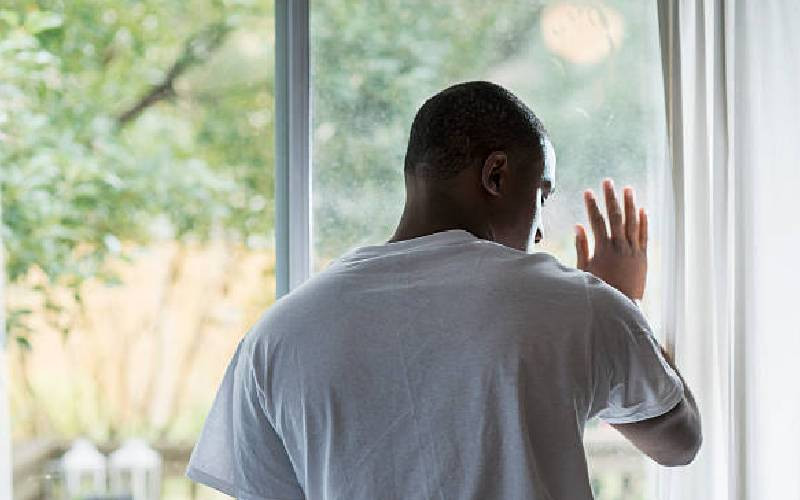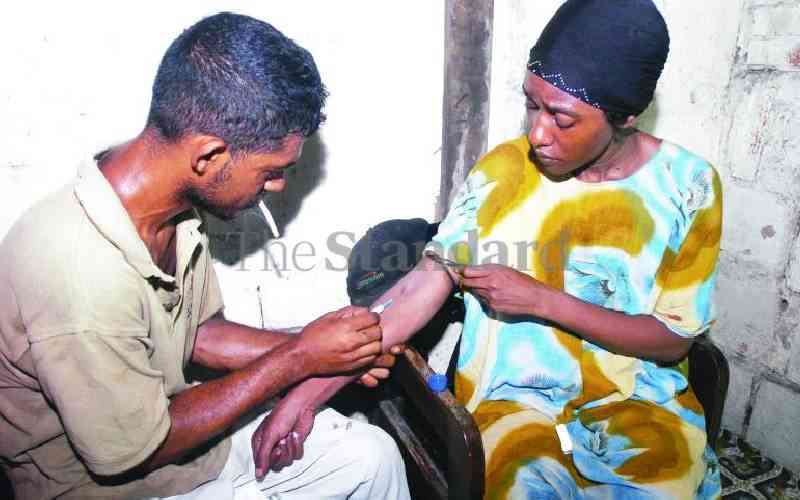
Mental health crises tend to escalate after festivities. [iStockphoto]
Feeling disappointed, sad and depressed, after the long festive season? Health experts have observed that mental health crisis tend to escalate after festivities.
According to the World Health Organisation (WHO), one out of four Kenyans seeking healthcare has a mental health condition, depression being the most common.
Dr Geoffrey Wango, a senior lecturer in Counselling Psychology at the University of Nairobi observes that most cases of mental illnesses, including anxiety, stress, depression and suicide, are reported in the months of February, March, April, May and June, while December records the lowest number of cases.
Wango says in December, even if people are depressed, they tend to relax more due to the festivities, as they meet their loved ones and share lovely moments.
In January, the grounds for stress sets up; for example, they report back to work and need money to pay bills.
He says a number of people spend more than what they earn. Also, a number of adults, in the age brackets of between 25 and 50 years, get into new relationships in December, which do not last.
- Gender PS urges teachers to break the silence on mental health
- A knock on the door saved my life: Woman narrates her fears after HIV diagnosis
- Is something bothering you? Tell it to an AI chatbot therapist
- My struggle with bipolar disorder
Keep Reading
"People spend more money in December, but in January, the landlords hover over compounds of those who have been feasting, seeking rent. Some divorces and soaring relationships begin to come in in February," says Dr Wango.
However, Lukoye Atwoli, professor of Psychiatry and Dean at the Aga Khan University Medical College in East Africa, says cases of mental illness are not linked to any specific cluster of the month.
Prof Atwoli, who was a member of the task force appointed by former President Uhuru Kenyatta in 2019 to look into the issue of mental health, says the current statistics are not reliable because people do not report suicides or suicide attempts due to stigma.
According to him, the only way to get accurate statistics is to make it possible for people to talk about suicidal triggers and attempts freely.
The mental health expert, who is also the Secretary General of the African Association of Psychiatrists, says for a start, decriminalisation of suicide should be a national priority.
"The data we have is only the tip of the icebag. We have to support the decriminalisation efforts. Our MPs need to go back and repeal the section of the penal code that criminalises suicide in order to have the population share accurate statistics," says Prof Atwoli.
The common mental illnesses in Kenya, according to the Mental Taskforce, include depression, suicide, substance use disorder, bipolar, schizophrenia and other psychoses.
According to the Kenya National Bureau of Statistics (KNBS), Kenya documented 421 deaths in 2018 as a result of suicide.
WHO estimates that 1,408 people die by suicide each year, translating to four people every day.
Globally, 703,000 people die by suicide each year, which means one person commits suicide every 45 seconds on average.
Prof Atwoli attributes cases of suicide to relationship conflicts for some people. It can also be a result of untreated mental illness. He says for many people with depression that are not on treatment, suicide is usually the final outcome.
People with schizophrenia and bipolar will also attempt suicide in their lives, if the illness is not treated or addressed, and those with chronic diseases also attempt suicide sometimes.
In addition, social circumstances can also drive people to suicide; for example, a loss of a loved one, a job, or something they hold dear.
"There are multiple reasons for certain people to attempt suicide, and are not clustered at a certain time of the year," says Atwoli.
Wango attributes the cases of mental illnesses to social and financial pressures.
For example, 32-year-old Beatrice Muthoni, a casual labour in a hardware in Gilgil town, has been sad for the past two weeks after she failed to pay rent for her one-bedroom house.
Muthoni spent her savings on Christmas shopping for her family, and has no saving left to cater for her bills.
"I have decided to switch off my phone because anytime it is on, my family members call to ask for financial support, and I do not have the money. Nobody believes I am broke," says the mother of three.
Wango clusters mental illness into demographics. He says among teenagers, the triggers are mostly relationships and peer pressure.
He says a number of teenagers are also affected by examination results, especially when they fail to get allocation in good secondary schools they aspired to join.

Common mental illnesses in Kenya include depression, suicide, substance use disorder, bipolar, schizophrenia and other psychoses. [iStockphoto]
In the age bracket of between 15 and 35, mental illness is a result of poor decisions, ego and failure to attain life targets, says Wango.
However, in old age, those aged between 60 and 65, the trigger results from stagnation and depression, failing to attain what they desired to.
"Suicide is not a moment event. It is a process, like a plane taking off. Before dying by suicide, the person feels stressed, frustrated, disappointed, depressed, and then decides to die by suicide," says Dr Wango.
Prof Godrick Mathews Bulitia, the Deputy Vice-Chancellor Academic and Student Affairs at Maasai Mara University and a HR expert, says workplace counselling is key in addressing mental health illnesses.
Prof Bulitia says common mental illness among employees include depression, stress and anxiety, cases triggered by financial constraints, while among students it is due to unhealthy relationships, and peer pressure.
"We have employees who have teenagers to take to school, need to own a home, and have the social stigma at home. A wife will remind him to buy a residential home. These issues easily trigger depression, anxiety, with some opting to die by suicide," he says.
Bulitia says among students first years enter into a free environment where parents are not playing any role. Due to the freedom, students tend to get into unhealthy relationships that result into depression, with some killing each other and others dying by suicide.
A number of students tend to be influenced by their peers, for example, learn to take alcohol, use drugs, and when overwhelmed, they die by suicide.
As a mitigation, he says institutions should set up mentorship programmes, especially for mentoring new students.
Other mitigations include supplying needy students with sanitary towels.
"It is important to define rules to students from the day of reporting. Have clear disciplinary procedures, extra curriculum activities, and avoid idling in schools, to curb mental illnesses," advises the dean.
At the workplace, he says there is a need to set up well-being centres to manage issues of employees, for example, finances, health, and social well-being.
Also, post-retirement services should be offered by the employer, for quality living after retirement.
In old age, employees require medical cover to seek healthcare, as such age attracts various diseases like hearing loss, cataracts and refractive errors, back and neck pains and osteoarthritis, chronic obstructive pulmonary disease, diabetes, depression and dementia.
To fight mental health illnesses, Prof Atwoli advises the government to fully implement his taskforce's report.
The taskforce gave birth to the Mental Health Act signed by President Kenyatta last year.
The Act acknowledges the rights of people with mental illnesses to live a productive life.
Another recommendation was increasing resources for mental services so that more people have access. However, implementation on the same has been sluggish, according to Atwoli.
"My expectation is that going forward, both national and county governments will put in place resources for mental health," he says.
"It costs us billions of shillings in lost productivity, when we have people with mental ill health who are not on treatment, and it will cost us a fraction of that to address the mental health problem, and improve our productivity. As this government thinks about improving economy for increased productivity, mental health must be at the core of the plans."
He says fighting mental health ranges from promotive, preventive, curative and rehabilitative care.
Atwoli says promotive health includes having people feed on a healthy diet, exercising, getting enough sleep and avoiding lifestyle issues like taking excess alcohol, use of tobacco and substance use.
Prevention of mental health entails taking active measures to reduce mental illnesses. For instance, when a child is conceived, ensure the mother has a healthy diet, the child is born with assistant health provider, early childhood illnesses that can affect the brain development are prevented, children live in a healthy environment free from abuse and violence.
"Early diagnosis prevents complications of mental illnesses by providing services at community level. All health workers should be equipped with skills to identify early signs of mental illnesses and do early interventions, and refer those in need of mental healthcare," says Atwoli.
Curative entails having facilities closer to citizens. Every county should have a psychiatrist and a mental health unit where someone can go in for outpatient and inpatient mental healthcare, he says.
Rehabilitative services, on the other hand, entail supporting patients to acquire lifestyle skills to integrate them back to the community.
Dr Douglas Ogolla, CEO, Human Resource Management Professionals Examination Board, says mental health has become an important topic of discussion in the recent past, given that many employees at the work place are experiencing increased cases of mental illnesses, including depression, suicide, anxiety and stress.
Ogolla attributes mental illnesses to targets and deadlines set for employees, which make them anxious.
"So many companies are in competition and are downsizing. A number are embracing a lean staff, a lean structure where there are few people, but the demand of work remains the same," he says.
Ogolla says a number of employees also lack financial discipline, which causes them to overspend the little they have during festivities, only to sink into depression in January due to more responsibilities like paying school fees and rent.
To deal with some of the mental challenges at work place, the HR expert says organisations should embrace some of the best HR practices, such as implementing employee assistance programmes. These programmes can include having financial advisers in place, establishing saccos for savings, and offering soft loans to employees.
Employers, Ogolla adds, can also establish employee yearly programmes, which may involve offering counseling services to help them cope with life and workplace challenges.
"The saving culture should be embraced by staff. They can also start welfare programmes for their staff and come up with other welfare activities like sporting to manage mental health problems," advises Ogolla.
 The Standard Group Plc is a multi-media organization with investments in media platforms spanning newspaper print
operations, television, radio broadcasting, digital and online services. The Standard Group is recognized as a
leading multi-media house in Kenya with a key influence in matters of national and international interest.
The Standard Group Plc is a multi-media organization with investments in media platforms spanning newspaper print
operations, television, radio broadcasting, digital and online services. The Standard Group is recognized as a
leading multi-media house in Kenya with a key influence in matters of national and international interest.











